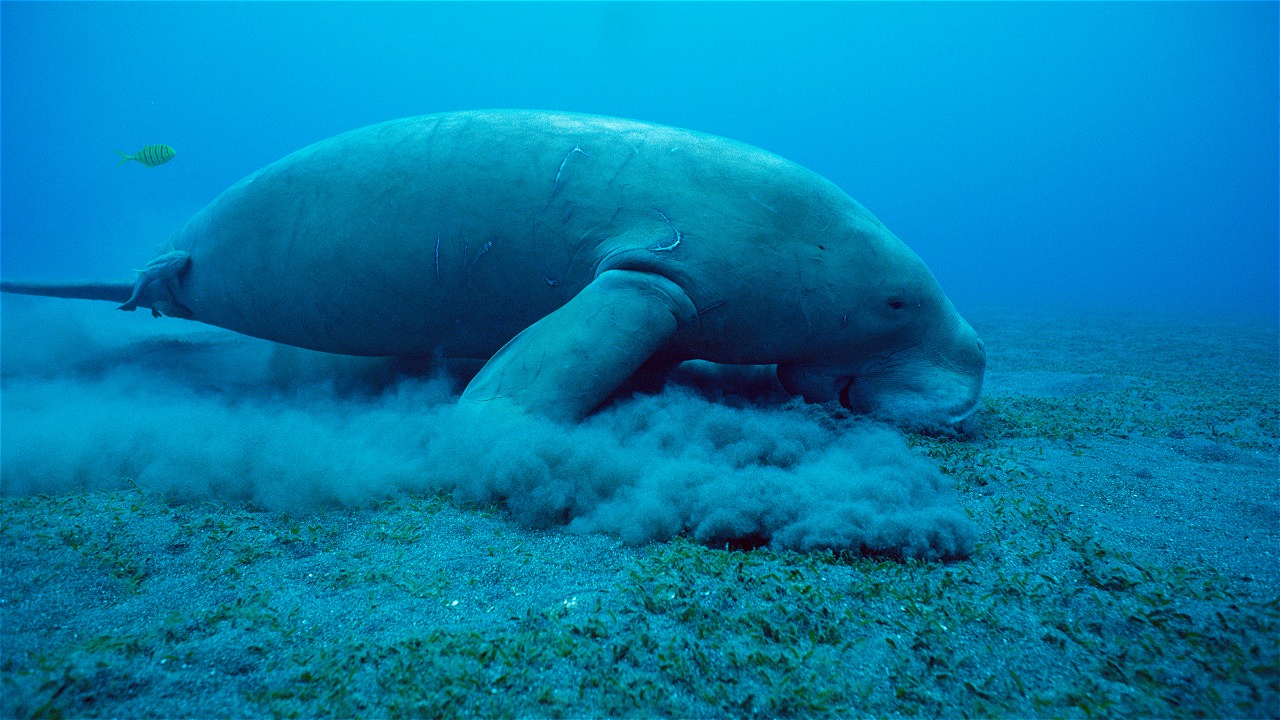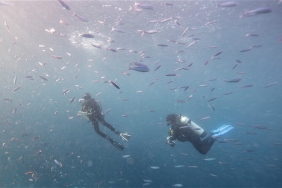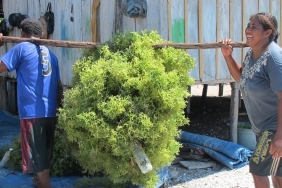DUGONG TOURISM IN ALOR: CAN IT BE REGULATED FOR SUSTAINABILITY?
By: Made Dharma (Alor & Flotim MPAs Coordinator WWF-Indonesia)
Kalabahi has recently received more and more visits from foreign and domestic tourists who want to see dugongs in Alor. Thankfully, community groups and the government have thought together how to manage tourism responsibly so that dugongs and their habitats are preserved. On January 18, 2018, the Department of Marine Affairs and Fisheries of East Nusa Tenggara (NTT) Province, the Department of Marine Affairs and Fisheries of Alor Regency and the Department of Tourism of Alor Regency in collaboration with WWF-Indonesia held a meeting to discuss the Draft Regent Regulation of Alor concerning Guidelines for Dugong Tourism in the Pantar Strait SAP and the Surrounding Sea.
This meeting is a continuation of the Workshop on the initiation of Duyung management policies in the Pantar Strait SAP and surrounding seas conducted in September 2017 by DKP NTT Province. One of the agreements produced at the meeting was the need to develop rules or codes of conduct governing the utilization of Duyung tourism in the Pantar Strait SAP conservation area, as well as further research on dugongs and their habitat.
The discussion of the draft Regent Regulation was attended by stakeholders from the government, namely the NTT Provincial Marine and Fisheries Service, Alor Regency Marine and Fisheries Service, Alor Regency Environment Service, Alor Regional Secretariat Legal Bureau, BKSDA Conservation Region 4, Munaseli Village Head, Pante Deere Village Head and Alor Police Satpolair. Stakeholders from the community, namely the Kabola Fishermen Communication Forum (FKNK), Pokmaswas Cinta Persahabatan Pante Deere Village and Pokmaswas Tanjung Muna Munaseli Village and stakeholders from the Alor District Tourist Association (HPI). The result of this meeting is the final draft of the Regent Regulation which will be submitted by the drafting team to the Alor Regional Secretariat Law Section for further review.
Guidelines for Duyung Tourism in Pantar Strait SAP and Surrounding Sea of Alor Regency
As one of the final drafts, a Regent Regulation is proposed that contains rules for the operational implementation of tourism and dugong observation activities. There are restrictions on dugong watching tourism activities that include vessel restrictions, visitation restrictions, and restrictions on interactions allowed during observation. These limitations are compiled so that they can become Standard Operating Procedures (POS) in carrying out Duyung watching tourism activities in the Marine Protected Area. The POS was developed based on recommendations from studies conducted by the dugong and seagrass conservation survey team (DSCP) through WWF-Indonesia and related partners aimed at observing the behavior and bioacoustic recording (sound) of dugongs. The existing recommendations direct how tourism activities should be carried out, so as not to interfere with biological aspects and change the behavior of these marine mammals. In addition, the POS also complements the dugong observation regulations that have previously been developed by local community groups.
The NTT Provincial Maritime Affairs and Fisheries Service as the manager of the Pantar Strait SAP Marine Protected Area and the Surrounding Sea showed support by providing technical guidance and socialization of tourism utilization guidelines within the Marine Protected Area. The Head of the NTT Provincial Marine and Fisheries Service, represented by the Conservation Section Head official, Budi Kabosu, stated that there are four Regional Marine Protected Areas that have been initiated by the District Governments, namely Alor, Lembata, East Flores and Sikka. This initiation is carried out in an effort to maintain Indonesia's marine biodiversity and provide sustainable benefits for coastal communities in NTT in accordance with the mandate of Law 23 of 2014, the province follows up the process of managing these marine protected areas.
Some of the steps that will be taken together, namely the establishment of a Marine Protected Area management unit in the form of a branch office of the agency that will be located in Alor Regency. So that the control range of conservation area management can be carried out more effectively. Budi Kabosu further mentioned that based on the general guidelines for tourism utilization in conservation areas, the concept is not mass tourism but ecotourism or sustainable tourism based on community and conservation. In addition, DKP NTT will also build an information center in SAP Selat Pantar where socialization and environmental education will be carried out about Duyung conservation and its habitat.
"Collaboration to protect marine biodiversity in the Pantar Strait SAP, especially Duyung and its habitat is one of the strategies and policies of the NTT Provincial government in developing the tourism sector with the aim of preserving natural resources and improving community welfare. In protecting and managing the tourism sector in NTT, joint efforts, coordination and synergy between the provincial and district/city governments are needed," Budi said. On the occasion, it was also conveyed that the DKP of NTT Province, DKP of Alor Regency and the Tourism Office of Alor Regency welcomed the support of technical assistance from various parties such as WWF and other partners in an effort to support the management of the tourism, fisheries and marine sectors in NTT Province.
Currently WWF together with the Ministry of Maritime Affairs and Fisheries through the DSCP (Dugong and Seagrass Conservation Program) program provides technical assistance on dugong management in the Pantar Strait SAP. Through collaboration between the central government, provincial government, local government, universities and NGO partners, it is expected to achieve the ideals of effective management of dugongs and their habitats that provide benefits for the welfare of the community and maintain their sustainability.





